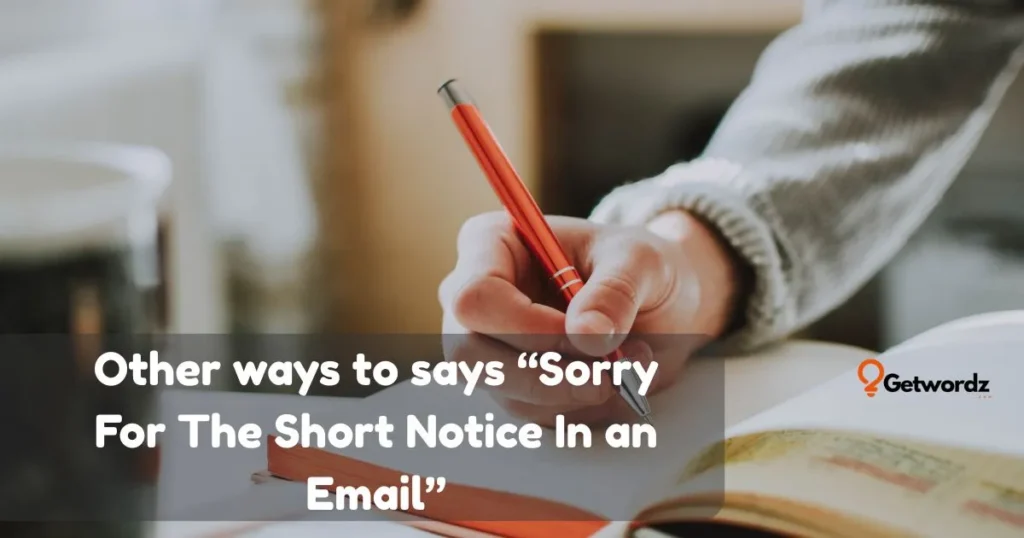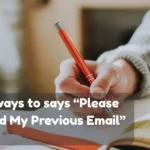“Sorry for the short notice in an email” , it’s polite, it’s safe, but let’s be honest… It’s also boring and overused. We’ve all been there, scrambling to send a last-minute message to a boss, client, or friend and defaulting to that same tired phrase. It gets the job done, sure, but it doesn’t always sound sincere or professional. So how do you say it better?
If you’re looking for fresh, creative, and genuine alternatives to “sorry for the short notice,” this post is exactly what you need. Whether you’re emailing a colleague about a sudden meeting change, updating a client with an urgent request, or letting friends know about a last-minute plan, the right wording can turn an apology into a message that feels warm, thoughtful, and confident.
Here, you’ll find powerful and polished expressions that sound natural, professional, and engaging, perfect for any situation.
Keep reading to discover how to apologize gracefully and grab attention without relying on the same old “sorry for the short notice.” Your next email is about to sound a whole lot better.
1. I Apologize for the Short Notice
Scenario: You’re emailing your manager about a sudden meeting or asking a teammate for help on short notice. You want to sound professional and respectful while acknowledging the rush.
Explanation: “I apologize for the short notice” is a formal, polished version of the phrase. It communicates responsibility and professionalism, an ideal alternative to sorry for the short notice in business emails or formal communication.
Examples:
- I apologize for the short notice, but our client requested a meeting change.
- I apologize for the short notice and appreciate your flexibility.
- I apologize for the short notice, and I’ll make sure to give more lead time next time.
Why It Works:
It conveys sincerity, accountability, and respect, helping maintain professionalism even under time pressure.
2. My Apologies for the Late Notice
Scenario: You’re reaching out to a colleague or client after realizing you sent a message later than expected.
Explanation: “My apologies for the late notice” feels slightly softer and more approachable than “I apologize.” It’s a creative alternative that sounds polite and empathetic while remaining professional.
Examples:
- My apologies for the late notice; there’s been an urgent update.
- My apologies for the late notice and thank you for accommodating the change.
- My apologies for the late notice, but I wanted to share this as soon as possible.
Why It Works:
This phrase feels genuine and kind, striking the perfect tone between formal and friendly.
3. Thank You for Your Understanding
Scenario: You’re informing someone about a sudden change or urgent plan but want to show appreciation instead of focusing on the apology.
Explanation: This phrase turns the focus toward gratitude, making it a better way to say sorry for the short notice. It replaces guilt with warmth and acknowledgment.
Examples:
- Thank you for your understanding regarding the last-minute change.
- I really appreciate your understanding, it means a lot.
- Thanks for your understanding and patience today.
Why It Works:
It’s a positive and forward-looking way to handle short-notice communication, making your message sound grateful rather than apologetic.
4. I Hope This Doesn’t Cause Any Inconvenience
Scenario: You’re emailing someone about a last-minute change, hoping it doesn’t disrupt their schedule.
Explanation: This is a polite and empathetic alternative that emphasizes concern for the recipient rather than your mistake. It works in both professional and casual contexts.
Examples:
- I hope this doesn’t cause any inconvenience, but the deadline has shifted.
- I hope this doesn’t cause any inconvenience, and thank you for adjusting so quickly.
- I hope this doesn’t cause any inconvenience, and I truly appreciate your support.
Why It Works:
It shows empathy and respect, making your message sound thoughtful and considerate.
5. I Know This Is Last-Minute
Scenario: You’re reaching out to a friend, colleague, or team with a sudden request or invitation.
Explanation: This casual, conversational phrase feels natural and self-aware, a different way to say sorry for the short notice that sounds honest without being overly formal.
Examples:
- I know this is last-minute, but can you join the call?
- I know this is last-minute, but would you like to grab dinner tonight?
- I know this is last-minute, but could you help with this quick task?
Why It Works:
It’s simple, relatable, and genuine, making it perfect for friendly yet respectful communication.
6. I Realize This Is Short Notice
Scenario: You’re updating someone about an urgent matter and want to acknowledge timing upfront.
Explanation: This phrase is professional yet humble, showing awareness of the situation. It’s a better wording option for business settings or client communication.
Examples:
- I realize this is short notice, but we need your feedback today.
- I realize this is short notice, but your presence would mean a lot.
- I realize this is short notice, though I wanted to include you in the loop.
Why It Works:
It’s direct yet respectful, acknowledging urgency without over-apologizing.
7. I Hope You Don’t Mind the Quick Notice
Scenario: You’re messaging someone close or familiar—like a coworker or friend—about an unexpected plan or update.
Explanation: This phrase feels casual and friendly. It’s a unique expression that adds warmth while still being polite.
Examples:
- I hope you don’t mind the quick notice, but we’ve moved the meeting to 9 a.m.
- I hope you don’t mind the quick notice, want to join us for lunch?
- I hope you don’t mind the quick notice, but we’d love to have you there.
Why It Works:
It keeps the tone relaxed and personal, making your message sound kind rather than rushed.
8. I Wanted to Let You Know As Soon As Possible
Scenario: You’re trying to communicate something urgent and want to emphasize your effort to notify them quickly.
Explanation: This is a proactive and empathetic alternative to “sorry for the short notice.” It shows responsibility and good intent.
Examples:
- I wanted to let you know as soon as possible that the schedule changed.
- I wanted to let you know as soon as possible so you can plan accordingly.
- I wanted to let you know as soon as possible before finalizing details.
Why It Works:
It replaces apology with action, showing consideration and transparency.
9. I Appreciate Your Flexibility
Scenario: You’ve asked someone to adjust to a last-minute change or unexpected situation.
Explanation: This phrase focuses on gratitude, making it a positive and professional alternative to “sorry for the short notice.”
Examples:
- I appreciate your flexibility with this last-minute request.
- I really appreciate your flexibility and understanding today.
- I appreciate your flexibility as we navigate this sudden update.
Why It Works:
It’s warm, thankful, and collaborative, perfect for maintaining good relationships at work.
10. I Regret the Short Notice
Scenario: You’re writing a formal email to a superior or client about an urgent issue.
Explanation: “I regret the short notice” is a formal and respectful alternative that shows professionalism and remorse without being overly apologetic.
Examples:
- I regret the short notice, but we’ve had an unexpected delay.
- I regret the short notice and appreciate your patience.
- I regret the short notice; we’ll ensure better communication next time.
Why It Works:
It carries weight and sincerity, making it ideal for official or high-stakes correspondence.
11. I Wanted to Reach Out Before It’s Too Late
Scenario: You’re emailing or texting about an event or opportunity happening soon.
Explanation: This creative alternative adds urgency in a friendly, proactive way. It implies thoughtfulness rather than oversight.
Examples:
- I wanted to reach out before it’s too late to invite you.
- I wanted to reach out before it’s too late to confirm your spot.
- I wanted to reach out before it’s too late to share the update.
Why It Works:
It feels energetic, human, and intentional,perfect for professional and personal use.
12. I Know This Might Be Unexpected
Scenario: You’re informing someone about something sudden or surprising.
Explanation: This empathetic phrase sounds kind and thoughtful, acknowledging the element of surprise without heavy apology.
Examples:
- I know this might be unexpected, but we need to meet earlier.
- I know this might be unexpected, but I’d love your input today.
- I know this might be unexpected, but I hope you can make it work.
Why It Works:
It’s approachable and emotionally intelligent, helping smooth over surprises naturally.
13. I Understand This Is on Short Notice
Scenario: You’re explaining a sudden change but showing empathy for the other person’s schedule.
Explanation: This professional yet warm phrase conveys awareness and respect, great for meetings or project communication.
Examples:
- I understand this is on short notice, but we need your expertise.
- I understand this is on short notice; please let me know what works best.
- I understand this is on short notice, and I truly appreciate your time.
Why It Works:
It blends professionalism with courtesy, keeping your message sincere and collaborative.
14. I Didn’t Want to Miss the Chance to Tell You
Scenario: You’re sharing exciting or time-sensitive news.
Explanation: This friendly and upbeat alternative replaces apology with enthusiasm, showing good intent behind the message.
Examples:
- I didn’t want to miss the chance to tell you about the event.
- I didn’t want to miss the chance to invite you before it’s too late.
- I didn’t want to miss the chance to share this update.
Why It Works:
It reframes urgency as care, making your email feel personal and positive.
Read more: 30 Other Ways To Say “Peace of Mind” With Examples!
15. I Hope This Works for You
Scenario: You’ve proposed something last minute and want to be polite about it.
Explanation: This phrase conveys flexibility and respect, making it a gentle way to handle short notice.
Examples:
- I hope this works for you despite the short notice.
- I hope this works for you; please let me know if adjustments are needed.
- I hope this works for you, and thank you for being understanding.
Why It Works:
It’s kind and considerate, showing that you care about the recipient’s comfort and schedule.
16. I Wanted to Give You a Heads-Up
Scenario: You’re notifying someone about a quick change, update, or situation that affects them soon.
Explanation: This casual and proactive phrase is a better way to say sorry for the short notice without actually apologizing. It feels friendly and considerate, perfect for work chats or casual emails.
Examples:
- I wanted to give you a heads-up that the schedule has shifted.
- I wanted to give you a heads-up before the announcement goes out.
- I wanted to give you a heads-up about tomorrow’s meeting.
Why It Works:
It shows initiative and care, helping you sound thoughtful instead of reactive.
17. I Hope This Update Reaches You in Time
Scenario: You’re sending an email right before a deadline or event and want to show awareness of timing.
Explanation: This polite and respectful alternative acknowledges urgency in a kind tone. It’s perfect for formal messages that still feel human.
Examples:
- I hope this update reaches you in time for the submission.
- I hope this update reaches you in time to make adjustments.
- I hope this update reaches you in time for tomorrow’s event.
Why It Works:
It blends professionalism with empathy, showing you value the recipient’s time and attention.
18. I Know This Isn’t Ideal Timing
Scenario: You’re contacting someone during a busy period or unexpected moment.
Explanation: This empathetic expression works well in both work and personal situations. It acknowledges the inconvenience while keeping your tone honest and understanding.
Examples:
- I know this isn’t ideal timing, but the deadline was moved.
- I know this isn’t ideal timing, but could we meet today?
- I know this isn’t ideal timing, though I really appreciate your help.
Why It Works:
It shows emotional intelligence and awareness, softening the impact of last-minute communication.
19. I Just Found Out Myself
Scenario: You’re informing someone about something you also learned recently, like a sudden schedule change.
Explanation: This relatable and honest phrase feels conversational and genuine. It works best in casual or team-based communication.
Examples:
- I just found out myself, and I wanted to let you know right away.
- I just found out myself, so I totally understand the short notice.
- I just found out about the reschedule for tomorrow.
Why It Works:
It creates transparency and trust, helping others understand you’re not at fault for the timing.
20. I Wanted to Reach You Before Things Get Busy
Scenario: You’re trying to share an update or make a request before someone’s day fills up.
Explanation: This is a creative and thoughtful way to express urgency without sounding apologetic. It feels considerate and well-timed.
Examples:
- I wanted to reach you before things get busy this morning.
- I wanted to reach you before things get busy so we can confirm.
- I wanted to reach you before things get busy to finalize details.
Why It Works:
It sounds kind, proactive, and respectful of the recipient’s time.
Read more: 30 Other Ways To Say “Please Find Attached” Examples!
21. I Hope This Message Finds You Well Despite the Rush
Scenario: You’re sending an urgent email but still want to keep your tone warm and courteous.
Explanation: This balanced and polished phrase acknowledges both professionalism and empathy, great for client or partner communication.
Examples:
- I hope this message finds you well despite the rush today.
- I hope this message finds you well despite the short notice.
- I hope this message finds you well despite the last-minute update.
Why It Works:
It keeps your email personable and respectful even under tight timelines.
22. I Wish I Could’ve Let You Know Sooner
Scenario: You’re expressing regret for not giving earlier notice to a friend, colleague, or client.
Explanation: This authentic and emotional phrase feels personal and sincere. It’s great for human-centered communication and relationship building.
Examples:
- I wish I could’ve let you know sooner, but plans just changed.
- I wish I could’ve let you know sooner and truly appreciate your understanding.
- I wish I could’ve let you know sooner, but it just came up.
Why It Works:
It feels heartfelt and honest, helping to maintain trust even when timing wasn’t ideal.
23. I Wanted to Inform You Right Away
Scenario: You’ve just received important information and need to share it quickly.
Explanation: This direct and professional phrase works well in corporate or client-facing emails. It shows quick action and reliability.
Examples:
- I wanted to inform you right away about the change in schedule.
- I wanted to inform you right away before the meeting begins.
- I wanted to inform you right away so you can adjust plans.
Why It Works:
It shows initiative and responsibility, helping you sound dependable and organized.
24. I Hope This Doesn’t Interrupt Your Day
Scenario: You’re reaching out suddenly but want to be polite and considerate.
Explanation: This gentle and courteous alternative softens your message while showing awareness of the recipient’s routine.
Examples:
- I hope this doesn’t interrupt your day, but we need a quick update.
- I hope this doesn’t interrupt your day, just wanted to share this.
- I hope this doesn’t interrupt your day, and thank you for your time.
Why It Works:
It sounds kind and humble, leaving a positive impression even in short-notice situations.
25. I Know This Is Out of the Blue
Scenario: You’re surprising someone with a spontaneous message or plan.
Explanation: This friendly and conversational expression adds a lighthearted tone while acknowledging the suddenness of your message.
Examples:
- I know this is out of the blue, but are you free tonight?
- I know this is out of the blue, but can we chat today?
- I know this is out of the blue, but something came up.
Why It Works:
It feels natural, relatable, and warm, perfect for informal or semi-professional settings.
26. I Didn’t Want to Wait Any Longer to Tell You
Scenario: You’re excited or urgent about sharing something, like good news or time-sensitive info.
Explanation: This positive and energetic alternative turns short notice into enthusiasm. It’s a great fit for friendly or upbeat communication.
Examples:
- I didn’t want to wait any longer to tell you the great news.
- I didn’t want to wait any longer to tell you about the event.
- I didn’t want to wait any longer to share the update.
Why It Works:
It makes your message feel intentional and caring rather than rushed.
Read more: 30 Other Ways To Say “Happy To See You” With Examples!
27. I Hope You Can Accommodate the Change
Scenario: You’re requesting someone’s flexibility for a schedule or event change.
Explanation: This professional and courteous phrase works perfectly in formal emails and client communication.
Examples:
- I hope you can accommodate the change despite the short notice.
- I hope you can accommodate the change; thank you for understanding.
- I hope you can accommodate the change to tomorrow’s agenda.
Why It Works:
It communicates respect and gratitude while keeping your tone polished and diplomatic.
28. I Appreciate You Adjusting So Quickly
Scenario: Someone made a last-minute adjustment to help you out, and you want to acknowledge it.
Explanation: This warm and appreciative phrase focuses on gratitude, not the delay. It’s great for teamwork and professional courtesy.
Examples:
- I appreciate you adjusting so quickly for today’s meeting.
- I appreciate you adjusting so quickly to the new schedule.
- I appreciate you adjusting so quickly; it means a lot.
Why It Works:
It’s uplifting and thankful, reinforcing teamwork and goodwill.
29. I Wanted to Catch You Before You Head Out
Scenario: You’re sending a quick message before someone logs off, leaves work, or ends their day.
Explanation: This casual and thoughtful phrase adds a personal touch to time-sensitive communication.
Examples:
- I wanted to catch you before you head out to confirm tomorrow’s meeting.
- I wanted to catch you before you head out about the deadline.
- I wanted to catch you before you head out to say thanks.
Why It Works:
It feels timely and polite, showing consideration for the recipient’s schedule.
30. I Know This Came Up Suddenly
Scenario: You’re explaining a last-minute update that wasn’t planned.
Explanation: This straightforward and genuine expression acknowledges the situation without unnecessary formality.
Examples:
- I know this came up suddenly, but we’ll handle it together.
- I know this came up suddenly, but I appreciate your flexibility.
- I know this came up suddenly, and I wanted to let you know right away.
Why It Works:
It’s simple, authentic, and emotionally intelligent, perfect for emails that require honesty and empathy.
✅ Pros and cons of Using “Sorry for the Short Notice in an Email”
pros
- Polite and respectful tone: It shows that you value the recipient’s time and recognize the inconvenience caused.
- Widely understood phrase: The wording is clear and recognizable in workplaces, schools, and professional settings.
- Professional communication standard: It fits seamlessly in formal emails, meeting updates, and client correspondence.
- Easy to use naturally: The phrase flows smoothly in sentences and maintains a polite, humble tone.
- SEO value and search relevance: It’s a high-traffic phrase people search when looking for better email wording, making it a strong keyword for blogs.
⚠️ Cons
- Overused and repetitive: It can sound predictable and lose impact if used too often.
- Too apologetic at times: It may unintentionally make you sound unsure or overly sorry in professional contexts.
- Lacks creativity: The phrase doesn’t stand out or add a personal tone to your message.
- Not ideal for casual conversations: It can feel too formal when writing to friends or close colleagues.
- Limited engagement potential: Because it’s so common, it’s less likely to catch attention or build a strong connection.
Closing words
Sorry for the Short Notice in an Email often feels like the only phrase we can use when time is tight, but this post showed how many fresh, creative alternatives exist to make your messages sound more personal and genuine. These expressions help you avoid repetitive wording and add warmth, sincerity, and clarity to your communication.
You can use these unique expressions in emails to colleagues, quick texts to friends, or even polite social media replies when timing isn’t ideal. Each alternative offers a different way to say it, whether formal, friendly, or thoughtful.
Try one of these creative alternatives in your next message to make your apology feel more natural and sincere. Small wording changes can transform your tone and show respect for others’ time. End your note with confidence using a thoughtful version of sorry for the short notice in an email that truly sounds like you.




